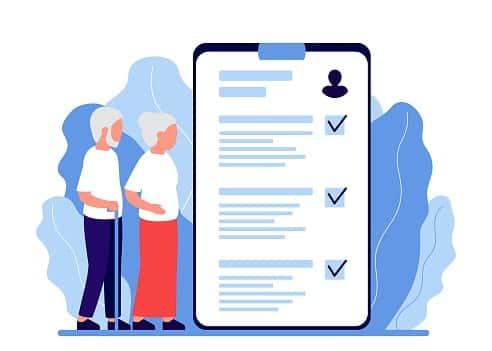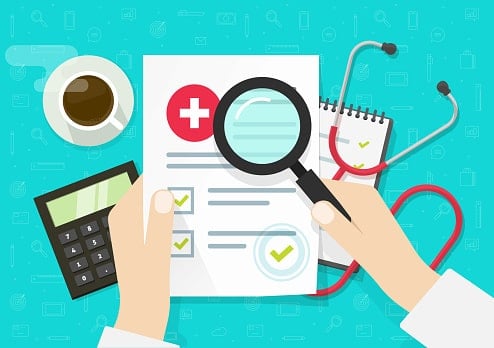- How to get individual health insurance
- How much does it cost to buy health insurance on your own?
- What’s the cheapest health insurance?
- When can you buy an individual health plan?
- Do you need individual health insurance?
- What do individual health plans cover?
- How to choose an individual health plan
- Individual health insurance subsidies
- Other ways to get health insurance
- What to consider when buying individual health insurance
- FAQ: Individual health insurance
How to get individual health insurance
To get individual health insurance, first decide whether you want an ACA plan or to buy directly from an insurance company.
Some things to consider: ACA plans can't deny coverage or increase rates for pre-existing conditions. Depending on your income, you may also be eligible for ACA plan subsidies.
Healthcare.gov has comparison tools, cost calculators and educational resources to help you select the right plan for you and your family. The website can also help you estimate any premium subsidies you may be eligible for. Healthcare.gov, as well as the state websites, have representatives available to help.
If you live in one of the 17 states with its own exchange, you will use the state website to enroll. Those states include:
- California
- Colorado
- Connecticut
- District of Columbia
- Idaho
- Kentucky
- Maine
- Maryland
- Massachusetts
- Minnesota
- Nevada
- New Jersey
- New Mexico
- New York
- Pennsylvania
- Rhode Island
- Vermont
- Washington
For any other state, use the federal government’s Healthcare.gov health insurance exchange to enroll.
You can find more individual and family options by shopping directly through health insurance companies offering plans outside the exchanges.
How much does it cost to buy health insurance on your own?
Generally, the less you have to pay out-of-pocket for deductibles, copays and coinsurance, the more you'll pay in premiums. Platinum plans charge higher premiums than the other three plans, but have lower deductibles. Bronze, meanwhile, has the lowest premiums but the highest out-of-pocket cost.
When deciding on the level, consider the medical services you used over the past year and what you expect next year. Healthcare.gov and the individual state websites have calculators to help you.
According to the Kaiser Family Foundation (KFF), the average premiums for the bronze, silver and gold plans are:
| Plan | Average Cost |
|---|---|
| Bronze (lowest cost) | $381 |
| Silver (lowest cost) | $486 |
| Silver (benchmark) | $497 |
| Gold | $507 |
What’s the cheapest health insurance?
The cheapest premiums in the ACA marketplace are Bronze plans. If you are eligible for subsidies, your premium cost for Silver and Bronze plans may be similar. Healthcare.gov and state websites have calculators to help you estimate your subsidies and total cost.
Non-ACA-compliant plans may be less expensive, but the benefits are limited. Be sure to compare them to the ACA plans before deciding.
There are also very cheap plans called catastrophic plans. These have very specific eligibility requirements and low monthly costs but high deductibles.
When can you buy an individual health plan?
You can purchase or change individual health insurance during the open enrollment period. Open enrollment for most states is from Nov. 1 to Jan. 15. States with their own exchanges usually offer expanded open enrollment.
States with slightly different open enrollment periods include California, the District of Columbia, Idaho, Maryland, New Jersey, New York, and Rhode Island.
The only other time you can get individual health insurance coverage is if you have a qualifying event that launches a special enrollment period. These events may have caused you to lose your health insurance coverage. The special enrollment period lasts 60 days.
Special enrollment qualifying events include:
- Getting married
- Having a baby, adopting a child or placing a child for adoption or foster care
- Moving
- Becoming a U.S. citizen
- Leaving incarceration
- Losing other health coverage due in the past 60 days to job loss, divorce, COBRA expiration or aging off a parent’s plan
- Losing eligibility for Medicaid or the Children’s Health Insurance Program (CHIP)
- Change in income or household status that affects eligibility for premium tax credits or cost-sharing subsidies
- Gaining status as a member of an Indian tribe
The ACA marketplace’s open enrollment is usually from Nov. 1 to Jan. 15 in most states, but some states have different periods.
People with income up to 150% of federal poverty level ($19,320 for a single person, $32,940 for a family of three) are eligible for a monthly special enrollment period. The Centers for Medicare and Medicaid Services estimates that about one-third of marketplace plan members qualify.
Do you need individual health insurance?
If you aren’t eligible for employer-sponsored health insurance, Medicare, Medicaid, veteran’s benefits or any other government program, you should buy individual health insurance.
You can buy individual health insurance through the ACA marketplace and non-ACA policies through brokers and directly from insurance companies.
What do individual health plans cover?
ACA marketplace Individual health insurance plans offer comprehensive coverage. ACA marketplace plans have to offer coverage regardless of your health history. You qualify for individual health insurance even if you’re pregnant or have a long-term condition like diabetes or a serious illness such as cancer. ACA marketplace health plans can’t cap the benefits you receive and limit out-of-pocket costs you must pay in a year.
In addition, all ACA marketplace individual health plans must cover a standard set of 10 essential health benefits:
- Outpatient care, including doctor’s visits
- Emergency room visits
- Hospitalizations
- Pregnancy and maternity care
- Mental health and substance abuse treatment
- Prescription drugs
- Services and devices for recovery after an injury or due to a disability or chronic condition
- Lab tests
- Preventive services, including health screenings, immunizations, and birth control. You pay nothing out of pocket for preventive care when you see healthcare providers in your plan’s network.
- Pediatric services, including dental and vision care for kids.
Plans that are not ACA-compliant are available directly from insurance companies. They’re generally less expensive, have limited benefits, and can decline to offer coverage based on your health history.
How to choose an individual health plan
There are different types of individual health plans. Plans in the ACA marketplace are divided into four metal tiers to make comparing them easier. The tiers are based on the percentage of medical costs the plans pay and the portion you pay out of pocket. Out-of-pocket costs include deductibles, copayments, and coinsurance.
| Plan | Plan Pays | You Pay |
|---|---|---|
| Bronze | 60% of healthcare costs | 40% of healthcare costs |
| Silver | 70% of healthcare costs | 30% of healthcare costs |
| Gold | 80% of healthcare costs | 20% of healthcare costs |
| Platinum | 90% of healthcare costs | 10% of healthcare costs |
The percentages are estimates based on how much medical care an average person would use in a year. Platinum plans, which pay 90% of healthcare costs, are more expensive than Silver plans that pay 70% of healthcare costs. Not all providers accept every plan.
Individual health insurance subsidies
People who buy an individual health plan through the ACA exchanges may be eligible for subsidies that reduce the cost of premiums.
The ACA allows tax credits and subsidies. Only people with household income below 400% of the federal poverty level are eligible for subsidies.
The Inflation Reduction Act of 2023 expanded subsidies through 2025. When searching for a plan through the ACA exchanges, the site provides cost estimates, including subsidies.
Reminder: People with an individual health plan outside of the exchanges aren’t eligible for subsidies.
Other ways to get health insurance
Individual health insurance is an option, but there are other ways beyond an employer plan for a person to get coverage:
- Short-term plans. These plans don’t offer the same benefits as a normal health insurance plan. Insurers aren’t required to provide comprehensive benefits. Most short-term health plans don’t cover maternity, prescription drugs and mental health. Instead, you pay for that care yourself. Short-term plans aren't meant as a long-term health insurance solution. You can only have them for one year and can request two extensions. These plans are low-cost, but they have limited benefits. Also, a handful of states don’t allow short-term plans, while others restrict them to shorter time frames.
- Medicaid. Medicaid is available to people who qualify. Thirty-nine states expanded Medicaid, which allows people who make up to 138% of the federal poverty level eligible for Medicaid. That level is $17,609 for a single person, $23,791 for a two-person family and $36,156 for a family of four. Medicaid plan costs depend on your income, but you’ll pay less for Medicaid than an employer or individual plan if you qualify. Medicaid offers comprehensive health insurance despite the lower costs.
- Catastrophic health plans. If you’re under 30 or meet income requirements, you could qualify for a catastrophic health plan. These plans offer lower premiums but come with much higher deductibles and out-of-pocket costs than standard health insurance plans. The idea behind catastrophic plans is to give people coverage to prevent financial ruin if they have emergency health care needs. Unlike short-term health plans, which don’t cover many services, catastrophic plans offer the same level of coverage as standard ACA plans.
What to consider when buying individual health insurance
Consider your health care needs and budget when shopping for an individual health insurance plan.
Here are some questions to consider:
How much flexibility do you want in your plan?
When choosing an individual health plan, you want to consider the type of benefit design. Health maintenance organization (HMO) plans are the most common plan design in the individual market.
HMOs include restricted provider networks. HMO members can only see doctors and get care from facilities in those networks. Also, you need a primary care provider referral to see a specialist.
Exclusive provider organization (EPO) plans don’t allow you to get care outside of the network, but you also don’t need a referral to see a specialist.
Preferred provider organization (PPO) plans are more flexible. You can see doctors both in your network and outside the network. You don’t have to get referrals to see specialists. However, PPOs have much higher premiums than HMOs, so you pay more for that flexibility.
Find out the differences between HMOs, PPOs and other types of health plans.
Are your providers in network?
Check the health plan's network to ensure it has a good selection of hospitals, doctors and specialists. Look for your providers in the plan’s network.
This is especially true if you get an HMO. HMOs have a restricted network and won’t pay for the care you receive outside of the network.
If you get a PPO, you’ll likely be able to get out-of-network care, but it can come at a higher price tag.
What does private health insurance cover?
Check to see if your prescription drugs are included in the plan's list of covered medications. Compare other benefits. Some plans may go above and beyond coverage mandated by law.
What are the insurance companies' reputations?
You’ll also want to check out the company’s consumer reviews and financial standing. You can review Insure.com’s Best Health Insurance Companies for customer satisfaction ratings and company A.M. Best Financial Strength Ratings.
Making a smart individual health insurance choice requires time and effort, but the homework you do now will pay off later when you and your family need care.
Health insurance finder tool

COBRA
Learn more about COBRA
How much is your annual household income?
How many members are in your household?
Medicare
Medicare costs vary depending on which option you choose.
Learn more about Medicare costs.
Medicaid

Parent's employer-sponsored health insurance

Spouse's employer-sponsored health insurance

Employer-sponsored health insurance

Preferred-provider Organization (PPOs)
Preferred-provider organization (PPOs) plans are the most common type of
employer-based health plan. PPOs have higher premiums than HMOs and HDHPs, but
those added costs offer you flexibility. A PPO allows you to get care anywhere
and without primary care provider referrals. You may have to pay more to get
out-of-network care, but a PPO will pick up a portion of the costs.
Find out more about the differences between plansHealth maintenance organization (HMO)
Health maintenance organization (HMO) plans have lower premiums than PPOs.
However, HMOs have more restrictions. HMOs don't allow you to get care outside
of your provider network. If you get out-of-network care, you'll likely have to
pay for all of it. HMOs also require you to get primary care provider referrals
to see specialists.
Find out more about the differences between plansHigh-deductible health plans (HDHPs)
High-deductible health plans (HDHPs) have become more common as employers look
to reduce their health costs. HDHPs have lower premiums than PPOs and HMOs, but
much higher deductibles. A deductible is what you have to pay for health care
services before your health plan chips in money. Once you reach your deductible,
the health plan pays a portion and you pay your share, which is called
coinsurance.
Find out more about the differences between plansExclusive provider organization (EPO)
Exclusive provider organization (EPO) plans offer the flexibility of a PPO with
the restricted network found in an HMO. EPOs don't require that members get a
referral to see a specialist. In that way, it's similar to a PPO. However, an
EPO requires in-network care, which is like an HMO.
Find out more about the differences between plans
Learn more about individual insurance plans
-- Les Masterson contributed to this report.
Sources:
- Health Insurance Coverage of the Total Population
- Are you eligible to use the Health care Marketplace
- Health care rights and protections
- Know more about Affordable Care Act
- Tips about the Health Insurance Marketplace
- Enroll in or change 2022 coverage with a Special Enrollment Period
- See if you can get Health coverage
- Marketplace Plan Selections by Metal Level
- Understanding Short-Term Limited Duration Health Insurance
- Three ways the Affordable Care Act marketplaces have evolved for consumers
FAQ: Individual health insurance
Can I buy health insurance on my own?
Yes, individual health insurance plans are available for people who don't have a health insurance plan through their employer. If they qualify for individual health insurance coverage, they can buy it on the open marketplace. Be sure to know your income limits and other requirements before you apply.
You may also be able to find an individual or family policy from another source such as an insurer that offers individual policies. Ensure you understand the terms before signing up for anything.
Can you get private health insurance?
If you do not have an employer-sponsored plan and are not eligible for Medicare or Medicaid, you can purchase insurance policies directly from private companies or through the health insurance marketplace.
What two parties pay for your health insurance if you enroll in an employer-sponsored plan?
Employers are responsible for buying individual health insurance for their employees. They do the research, choose an insurer and determine your plan options. Both parties share the costs of these plans, you contribute to your monthly premiums, the amount is deducted from your monthly paycheck, and your employer also pays a portion of the premium.
Can you buy health insurance for someone else?
You can buy health insurance for minor children or include them in your plan. You can pay premiums for anyone you like, but they must apply for the coverage.
How do you pay for health insurance on your own?
Marketplace subsidies can make health insurance premiums affordable for many people. If you aren’t eligible for subsidies, a high-deductible plan may be an option. You can contribute to a health savings account (HSA) if you have a high deductible plan and use pre-tax money to pay for qualified medical expenses, including deductibles.
Is it cheaper to buy your own health insurance?
If you’re eligible for an employer-sponsored plan, you’re generally not eligible for ACA subsidies. A short-term plan may be less expensive; however, the benefits will be much more limited than your employer’s plan.












